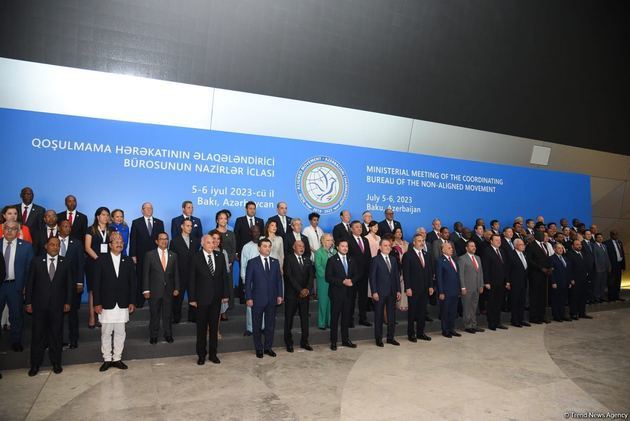A ministerial meeting of the Coordinating Bureau of the Non-Aligned Movement has opened today in Baku.
The meeting, which will be held on July 5-6, is attended by representatives of the member countries of the Non-Aligned Movement.
"A total of 120 participating states, 18 observers and 10 international organizations, including Azerbaijan, have played an important role in the history of the Non-Aligned Movement," the Azerbaijani Foreign Miistry said.
The meeting is also attended by Azerbaijani Foreign Minister Jeyhun Bayramov.
President of Azerbaijan Ilham Aliyev addressed the Ministerial Meeting, stressing that the NAM Azerbaijani chairmanship vigorously protected justice and international law and the legitimate interests of Member States in line with the “Bandung principles".
"When the international community was confused over how to deal with the COVID-19 pandemic, it was NAM that consolidated global efforts in countering this unprecedented challenge," the head of state noted.
"Currently we are also working on the establishment of the NAM women platform. With these steps towards the institutional sustainability, we will definitely leave a successful legacy to incoming chairs," Ilham Aliyev said.
The Azerbaijani leader noted that supporting countries in need was another priority for Azerbaijani chairmanship. "Azerbaijan provided COVID-19-related financial and humanitarian support to more than 80 countries, most o those from NAM either bilaterally or through World Health Organization. Azerbaijan made voluntary contributions to the World Health Organization in the amount of $10 mln. We also provided vaccines to 5 countries," he said.
The Azerbaijani president noted that as a true defender of multilateralism and the second largest international institution after the UN, NAM has to find its own place in the newly reshaping world order.
"We need to stand firm around Bandung principles, make our voice louder against cases of violation of sovereignty and territorial integrity and intervention in the internal affairs of states. Our movement’s more visible presence in the world affairs is vital," Ilham Aliyev said.
The Azerbaijani head of state noted that international organizations, in particular, UN does not meet up to the expectations of the mankind, inevitably UN needs to go through serious reforms.
Pointing out that the UN Security Council is reminiscent of the past and does not reflect the current reality, the Azerbaijani president said: "We advocate the expansion of the composition of the Security Council to make it more representative and more geographically fair. I am glad that today there is a growing consensus on this idea worldwide."
"We are of the view that countries holding the position of chair of the NAM, Organization of Islamic Cooperation and African Union should have their seats at the UN Security Council on a rotating basis with a veto right," Ilham Aliyev said.
Promotion of intercultural and interreligious dialogue should be high on the movement's agenda, Aliyev said, expressing cocern by rising Islamophobia and xenophobia as well as attempts to equate Islam with violence and terror.
"Burning and desecration of the Holy Quran in Denmark, Netherlands, Sweden and justifying it under the guise of the freedom of expression is totally irresponsible and inadmissible and must be condemned,” Ilham Aliyev said.
He recalled that 65 mosques out of 67 in the formerly occupied territories were destroyed by Armenia and remaining ones were used as stables for pigs and cows, which is an insult against all Muslims of the world, 60,000 hectares of forests have been destroyed, cut down and taken away, soil and rivers have been polluted and contaminated.
Ilham Aliyev said that Armenia continues causing transboundary environmental disaster along the border with the Nakhchivan Autonomous Republic of Azerbaijan, violating its obligations stemming from the 1991 Convention on Environmental Impact Assessment in a Transboundary Context (Espoo Convention), which clearly stipulates that respected countries must consult each other to avoid an adverse transboundary impact.
After the liberation of our territories, Azerbaijan is facing a number of huge challenges.
"We were shocked by the scale of destruction in the formerly occupied territories. Azerbaijani cities and villages were deliberately destroyed, looted brick by brick, all cultural and religious sites, mosques were desecrated and plundered by Armenia," Ilham Aliyev said.
Shortly after the end of the conflict, Azerbaijan presented five basic principles for signing peace treaty with Armenia based on the mutual recognition of each other's sovereignty and territorial integrity. Although Armenia had to recognize Karabakh as a part of Azerbaijan, there are still remnants of Armenian armed forces in the territories of Azerbaijan, the Azerbaijani president noted, adding that if Armenia is really interested in achieving the long-awaited peace in the region, then its armed forces must completely leave the Karabakh region of Azerbaijan.
Armenia also impedes the opening of Zangazur corridor, which will connect the main part of Azerbaijan with the Nakhchivan Autonomous Republic, which is another commitment of Armenia deriving from the capitulation act it signed on 10 November 2020.
Extending his deep gratitude to Non-Aligned Movement countries for their principled stance in supporting the just position of Azerbaijan during and after the end of occupation, the head of state refered two specific cases in 2020 and 2022, when NAM countries prevented one-sided and biased anti-Azerbaijani statements from passing in the UN Security Council.






